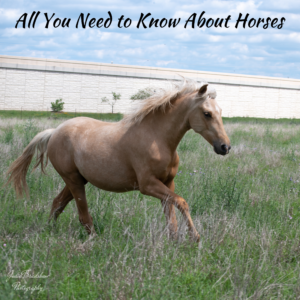
All you need to know about horses is actually far more simple than you might expect. As a species, we often make things more complicated than they have to be.
For over a decade, I have been teaching people to trust their intuition. When I first began learning these things myself, I read lots of books, attended classes, and followed people on social media. And what I began to realize is that the experts who touted THEIR system and their way of doing things as being THE thing, were not ones I wanted to follow.
I would try their way and it didn't work for me. It made me doubt myself. Was I doing it wrong?
Follow Your Own Path
What I learned was I was not in fact doing it wrong at all. In fact, the more I did what worked for me, the stronger my intuition became.
When I got back into horses years ago, I did some of the same things. I read books, I attended classes, and I followed horse trainers on social media. I gained some great knowledge, about both what to do and what NOT to do. And I came to the same realization, the experts who had “systems” that had to be followed, that put themselves on a pedestal, that said “if you're not doing it my way, you're doing it wrong” threatened to lead me down the manure pile of doubt.
I've had stallions, geldings and mares. I've had short horses and very, very tall horses. I've had the youngest of horses to seniors. Every one of them has taught me something.
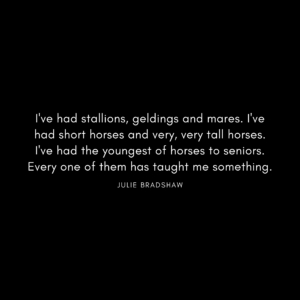
My Connection with Horses
Scout, my Dutch Warmblood gelding, who was my soulmate in horse form, taught me more things than I could possibly detail in one article. I think more than anything, he taught me that I had an innate gift with horses that I needed to believe in. From the moment I met him, we were connected. I hadn't owned a horse in 20+ years. And there was no denying that this horse, that was labeled as too dangerous to ride, and that numerous people told me not to take, was meant to be with me. I cried, I laughed, I got angry and more than anything, I loved for the short 4 years he was with me before he asked me to help him cross the Rainbow Bridge.
Every single person that saw us together, whether stranger or friend, commented on our obvious connection. Because of him, I trusted in that connection.
As other horses made their way to me, I used that trust in my connection to bond with and train them as well. Shut down horses, angry horses, crazy thin horses, overweight horses, feral horses, aggressive horses, horses in pain, and traumatized horses. I took them all in and learned from them.
The Lessons You Don't Expect
The other horse who has taught me more than I could ever detail in one article is one of my current horses, Ankh. (pronounced onk) He was just the opposite of Scout when he came to me. He had no use for people and was pretty angry a lot of the time. But he had a curiosity and playfulness at times that sucked me in. I've had multiple people tell me to sell him. I've come really close, I don't deny it, but recently I've figured out he's been trying to tell me something for a long time and I just had a very difficult time interpreting his message.
What he has taught me the most about is the importance of herd dynamics and how critical that dynamic can be to either support or break down the well-being of the horses within that herd. And sometimes that can come into play with them on the same property together, not even pastured together.
All of these horses that came to me began to heal. Some of them healed to the point of being able to go to other homes. Some could only heal so much and needed me to release them from this world. And some have stayed with me.
Training People to Train Horses
As I began to expand the work I did with my horses into working with horses owned by others, I saw that there was a great desire for people to develop that same kind of connection with their horses that I had developed with mine.
“I just want to have a better connection with them.” “I want to know if they are happy with me.” “I wish they could talk.” These are things I hear frequently.
And I used the “All You Need to Know About Horses” theory of mine coupled with neuroscience, horse behavior, and all of my experience with intuition/energy and horses to guide them. Because if you have that knowledge, you will have a better connection, you won't wonder if they are happy and you'll find yourself having conversations with them.
While a few of them raised their eyebrows at me, the vast majority were all in and discovered just how powerful and effective it was. Most importantly, they discovered just how powerful and effective THEY were.
The relationships with their horses vastly improved. But more than anything they felt more confident in themselves. Confidence begets confidence.
My Inspiration and Answer
I've been helping other horses as I'm asked by referral only, but due to a recent incident that occurred with a horse that I sold, I've decided to expand more on my training philosophies as I feel that if even one person gains something that can help their relationship with their horse, then it will make a difference.
So, all you need to know about horses is this:
Do what works for YOU and YOUR horse. Do what feels right to YOU.
Listen to your horse, not just a little, a LOT.
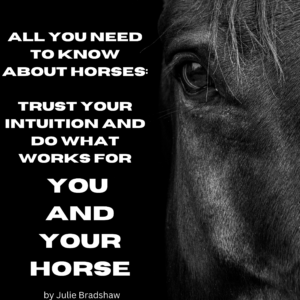
What I immediately hear from some of you as I type that is “I don't know what to do!”
Here are a few things you can do to start:
- Spend more time on the ground with them than you do in the saddle. I'm not saying forever, but the more you get to truly know your horse, the better the connection. There is no way to get to know them better than being on the ground with them. Walking around in the arena, the pasture, the paddock, reading a book while they are grazing, touching them if they like to be touched, just BE-ing together.
- Observe their behavior with you and with other horses. Pay attention to the smallest of behaviors. What way do they turn their head in certain situations? How are they “talking” to other horses with their behavior? How are they talking to you? The same? Different?
- Pay attention to your own energy each time you are with them. Are you tense? Are you frustrated? At peace? Feeling happy? How do they respond in kind? Horses are less likely to have a negative response to you as long as you are honest about the feelings. Don't hide your emotions. Whatever you are feeling, honor it, for yourself and them. If you're having trouble managing your emotions while training, read my article 7 Tips to Manage Emotions While Horse Training.
- Read some books. Take what feels right, what works, but leave what doesn't.
- Remember that the best expert on your horse is YOU. Experts can guide you, they can give you expertise from their perspective and knowledge, but they are not there with you and your horse day in and day out. If any expert makes you doubt your own expertise, run away. I will always ask you instead, “What feels right to you?”
- Come back and read more of my articles or follow me on Facebook (or both.) I'll be posting more and more about my training style and tips. You can take what works for you and your horse and leave what doesn't. I will never give you absolutes.
There you have it, all you need to know about horses is to trust your intuition and do what works for you and your horse. Remember you are the expert. I'm the expert on my horses and I'm still learning every single day. So, I'm no better than you are. I'm just here to remind you of your awesome expertness!
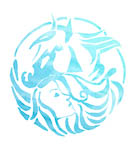
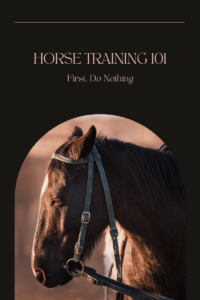
Excellent. Very well said. I appreciate in particular the advice about spending time on the ground them. Spending time with them in their routines — while they graze, while they sleep, while they ponder and absorb their surroundings — there’s real magic to be found in that.
Thank you Mary! I truly find most everything I need to know about a horse’s behavior in doing those things with them. It provides so many good nuggets of info. Appreciate you reading and commenting!
Love this article Julie! Herd dynamics are definitely a big key to horse relationships. We are due to separate some herd members into different groups because of conflicts that I didn’t see until I really started paying attention to the subtle things. Great info as always!
Thanks Kelly! I find it fascinating how much one change can have an impact. And even that sometimes it doesn’t. Things can be continuously evolving depending on who is involved. Glad you figured it out too!